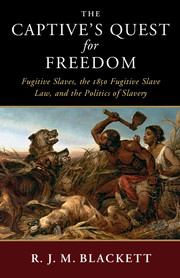 The Captive's Quest for Freedom
The Captive's Quest for Freedom from PART II - FREEDOM'S FIRES BURN
Published online by Cambridge University Press: 19 January 2018
Throughout the lengthy and acrimonious debate over the Fugitive Slave Law, opponents in and out of Congress warned that, without guaranteed legal rights, such as habeas corpus and trial by jury, there would be social and political dislocations and even violence. In September 1851, just one year after the law came into effect, these dire warnings were fulfilled in the black rural community in the small Pennsylvania village of Christiana, an area, one observer later recalled, which had become a focal point of opposition to the law. Over the years, the black community had formed a “mutual protection” organization to defend themselves, especially those fugitive slaves who had made a home there, against intrusion by kidnappers and slave catchers from across the state line in Maryland. Before “we can have peace,” they vowed, “we must have trouble.” Its leader was William Parker, who, as a young man of nineteen, had escaped with his brother from Maryland in 1839. As Parker later recalled, every two or three weeks the alarm was sounded warning of a possible intrusion. They had some successes repelling these incursions, but there were also painful losses. One night early in the fall, the alarm was raised again. A party headed by Edward Gorsuch, members of his family, and a small posse led by a deputy marshal from Philadelphia had arrived in search of Gorsuch's former slaves. One hundred and fifty blacks and a small number of white farmers responded to the alarm. Rather than withdraw, Gorsuch insisted on storming the small farmhouse where Parker and his family had barricaded themselves. Shots were exchanged, at the end of which Gorsuch lay dead and his son and nephew seriously wounded.
What followed was an escape that had all the hallmarks of a fugitive's flight to freedom. Parker, his brother-in-law, Alexander Pinkney, and Abraham Johnson left Christiana almost immediately, following a route familiar to any operative of the UGRR. They headed east first to Penningtonville, then to Parkersburg and Downington in Chester County. From there, they traveled northeast to Norristown in Montgomery County, where they were aided by William Lewis, a black operative on the UGRR. Lewis took them by wagon north to Quakertown in Bucks County.
To save this book to your Kindle, first ensure [email protected] is added to your Approved Personal Document E-mail List under your Personal Document Settings on the Manage Your Content and Devices page of your Amazon account. Then enter the ‘name’ part of your Kindle email address below. Find out more about saving to your Kindle.
Note you can select to save to either the @free.kindle.com or @kindle.com variations. ‘@free.kindle.com’ emails are free but can only be saved to your device when it is connected to wi-fi. ‘@kindle.com’ emails can be delivered even when you are not connected to wi-fi, but note that service fees apply.
Find out more about the Kindle Personal Document Service.
To save content items to your account, please confirm that you agree to abide by our usage policies. If this is the first time you use this feature, you will be asked to authorise Cambridge Core to connect with your account. Find out more about saving content to Dropbox.
To save content items to your account, please confirm that you agree to abide by our usage policies. If this is the first time you use this feature, you will be asked to authorise Cambridge Core to connect with your account. Find out more about saving content to Google Drive.